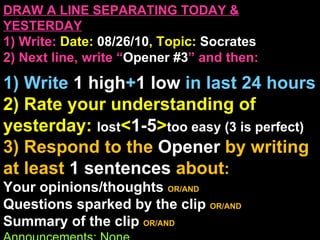082610 world socrates 50m
- 1. DRAW A LINE SEPARATING TODAY & YESTERDAY 1) Write: Date: 08/26/10 , Topic: Socrates 2) Next line, write “ Opener #3 ” and then: 1) Write 1 high + 1 low in last 24 hours 2) Rate your understanding of yesterday: lost < 1-5 > too easy (3 is perfect) 3) Respond to the Opener by writing at least 1 sentences about : Your opinions/thoughts OR/AND Questions sparked by the clip OR/AND Summary of the clip OR/AND Announcements: None
- 2. Agenda 1) Socrates 2) Epicurus Primary Objective 1) How did the Greeks inspire the enlightenment? Reminder 1) Fill out 2 e-forms, setup your Google and Ning account by Friday.
- 3. Ěý
- 4. Ěý
- 5. Notes #2a , Title: “ Greece ” 1) Sparta : Ruled by oligarchy (small elite), created concept of “community before self” (classical republicanism) 2) Athens : a) 700-500BC ruled by aristocrats Poor revolted (508BC) b) 508BC-404BC first democracy Athens thrived (esp culturally) c) 404BC conquered by Sparta, 338BC by Alex G Threw doubt on democracy (esp direct dem)
- 6. SPARTAN CLASSICAL REPUBLICANISM 1) Students sent to live in government schools at 7 yrs old. 2) Boys trained to fight (no fear), girls trained to raise families (more Spartans warriors). 3) Women had more rights as their role mothers was critical. 4) Unfit babies were left outside the city to die. (Hooker 2006)
- 7. HOW DEMOCRACY BEGAN 1) Wealthy take advantage of the more numerous poor . 2) Weapons become cheaper to make. So even poor people, who were the majority could be armed, increasing their power. 3) Fearing that poor people would revolt, democracy was seen as a way to make the poor happy .
- 8. ATHENS DEMOCRACY PROFILE 1) All male citizens could vote (1/5) and propose laws (direct democracy) [Rome goes with republic/repres. dem] 2) Created paid jobs for politicians so that poor people would become politicians. 3) People could vote to exile people/leaders (ostracize for 10 years) 4) Regular people could sue other people, making disputes more just [Rome introduced consistent written law]
- 9. Ěý
- 10. Journal #3a , Title “ Video: Socrates ” 1) Copy Source Title: BBC 2…) Discuss questions on the board with a partner. Summarize your discussion ( include their name at the end ). Remember participation points are deducted if off task. 5 Reading/Film Qs Come From These Journal Sections Time Bookmark: 00:00
- 11. 10 Points: Fill out the paper copy, AND the first e-form. Make sure to write your name in the book with the barcode #, in case it falls off.
- 12. Second E-Form Both forms at: www.govandlaw.org/mvhs
- 13. Homework Due Friday (30 Points): 1) Fill out 2 E-Forms 2) Create a Google Account (Gmail or linking non-Gmail w. Google) 3) Join class Ning and upload a photo Remember login names








![ATHENS DEMOCRACY PROFILE 1) All male citizens could vote (1/5) and propose laws (direct democracy) [Rome goes with republic/repres. dem] 2) Created paid jobs for politicians so that poor people would become politicians. 3) People could vote to exile people/leaders (ostracize for 10 years) 4) Regular people could sue other people, making disputes more just [Rome introduced consistent written law]](https://image.slidesharecdn.com/082610worldsocrates-50m-100826213511-phpapp01/85/082610-world-socrates-50m-8-320.jpg)




